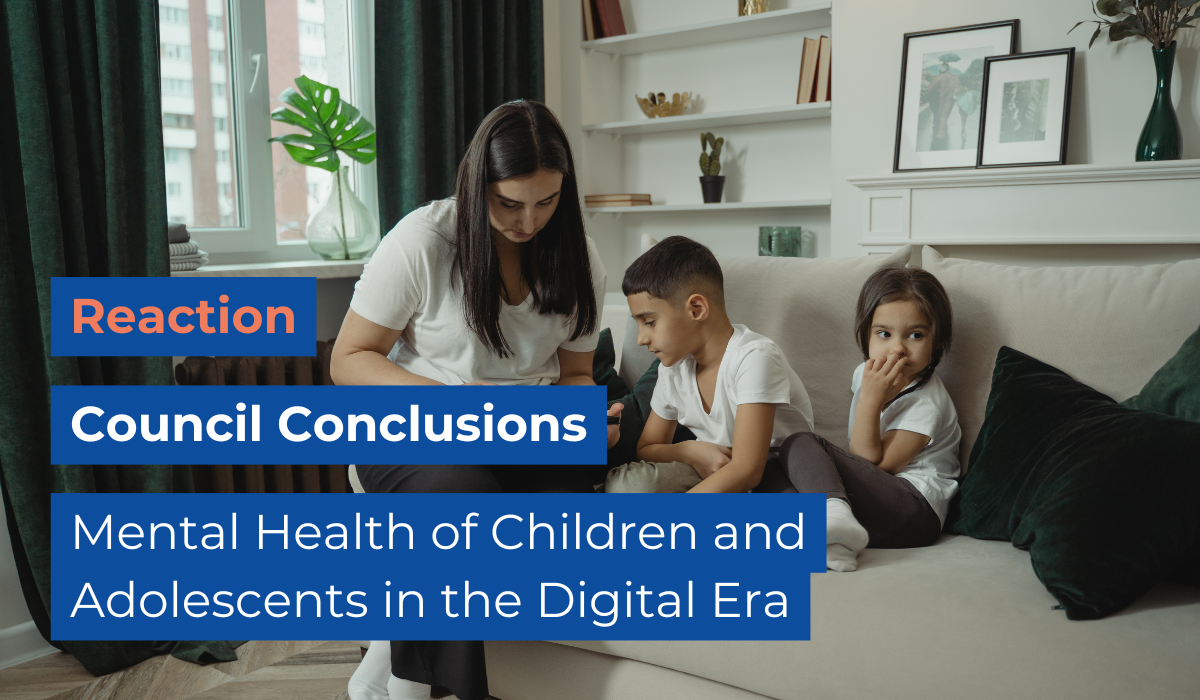Council Conclusions on Youth Mental Health in the Digital Era – Reaction

Mental Health Europe Reaction
Council Conclusions on Promoting and Protecting the Mental Health of Children and Adolescents in the Digital Era
Mental Health Europe welcomes the adoption of the Council Conclusions on promoting and protecting the mental health of children and adolescents in the digital era. We commend the Polish Presidency for keeping youth mental health high on the EU policy agenda and for recognising the dual impact of digital technologies on young people’s wellbeing.
We are pleased that many of our long-standing priorities are reflected, including the acknowledgment of psychosocial factors, the role of socio-economic inequality, and the importance of digital design practices. The Conclusions take important steps in recognising the connection between mental health with digital policy and in highlighting the need for safe, inclusive, and age-appropriate digital environments. We also welcome the call for multidisciplinary research into the digital determinants of youth mental health.
However, several opportunities for stronger commitment remain. While there is mention of the need for the development and enhancement of social infrastructure, there was a missed opportunity to underline community-based and rights-based supports. The Conclusions primarily frame solutions around education and parental awareness, yet do not go far enough in supporting sustainable investment in grassroots, peer-led, and community-driven psychosocial services. We welcome the encouragement of digital literacy, physical health and healthy use habits. Nevertheless, real transformation requires embedding support systems across environments surrounding young people, both online and offline, particularly for those living in marginalisation or exclusion. Promoting mental wellbeing in this way requires societal change to reduce discrimination, avoiding overfocus and responsibility being placed on individuals, but instead creating supportive environments.
We are also pleased to see references to harmful digital design, such as dark patterns and addictive interfaces, and call on Member States and digital platforms to take stronger regulatory action to prevent exploitation of young users. However, the text notably avoids addressing in detail the core structural issue – that the business models of social media and gaming platforms are built on maximising engagement and monetising attention. Mental health must be a core priority not only for education or youth policy, but also for digital regulation, product design, and data ethics by identifying the role of digital platforms.
Mental Health Europe is particularly encouraged by the emphasis on early intervention and prevention. We reiterate that policies must reflect the full mental health continuum. References to awareness campaigns, mental health support in schools and youth services are vital, but they must be paired with adequate resources and long-term structural commitments, including an intersectional European Mental Health Strategy and a European Year on Mental Health.
Overall, Mental Health Europe warmly welcomes the Polish Presidency’s commitment to promoting mental health. The Council Conclusions mark a pivotal step in addressing youth mental health in the digital era. We call for their swift implementation, sustained political will, and meaningful engagement with young people, through co-creation, especially for those with lived experience. Mental health is a fundamental right, and digital environments must reflect that reality. We remain available to further strengthen our collaboration to work towards a long-term commitment and concrete actions in mental health.
Stay connected
Get our latest news, personal stories, research articles, and job opportunities.

